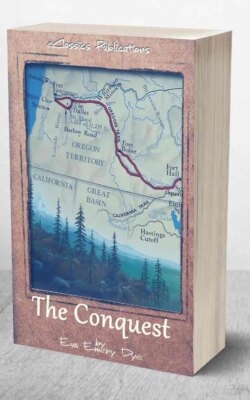Читать книгу The Conquest: The True Story of Lewis & Clark - Eva Emery Dye - Страница 9
На сайте Литреса книга снята с продажи.
Chapter IV – THE WILDERNESS ROAD
ОглавлениеDaniel Boone threw back his head and laughed silently.
For a hundred miles in the barrier ridge of the Alleghanies there is but a single depression, Cumberland Gap, where the Cumberland river breaks through, with just room enough for the stream and a bridle path. Through this Gap as through a door Boone passed into the beautiful Kentucky, and there, by the dark and rushing water of Dick's River, George Rogers Clark and John Floyd were encamped.
The young men leaped to their feet and strode toward the tall, gaunt woodsman, who, axe in hand, had been vigorously hewing right and left a path for the pioneers.
"They are coming,—Boone's trace must be ready. Can you help?" Boone removed his coonskin cap and wiped his perspiring face with a buckskin handkerchief. His forehead was high, fine-skinned, and white.
"That is our business,—to settle the country," answered the young surveyors, and through the timber, straight as the bird flies over rivers and hills, they helped Boone with the Wilderness Road.
It was in April of 1775. Kentucky gleamed with the dazzling dogwood as if snows had fallen on the forests. As their axes rang in the primeval stillness, another rover stepped out of the sycamore shadows. It was Simon Kenton, a fair-haired boy of nineteen, with laughing blue eyes that fascinated every beholder.
"Any more of ye?" inquired Boone, peering into the distance behind him.
"None. I am alone. I come from my corn-patch on the creek. Are you going to build?"
"Yes, when I reach a certain spring, and a bee-tree on the Kentucky River."
"Let us see," remarked Floyd. "We may meet Indians. I nominate Major Clark generalissimo of the frontier."
"And Floyd surveyor-in-chief," returned Clark.
"An' thee, boy, shall be my chief guard," said Daniel Boone, laying his kindly hand on the lad's broad shoulder. "An' I—am the people." The Boones were Quakers, the father of Daniel was intimate with Penn; his uncle James came to America as Penn's private secretary; sometimes the old hunter dropped into their speech.
But people were coming. One Richard Henderson, at a treaty in the hill towns of the Cherokees, had just paid ten thousand pounds for the privilege of settling Kentucky. Boone left before the treaty was signed and a kindly old Cherokee chieftain took him by the hand in farewell.
"Brother," he said, "we have given you a fine land, but I believe you will have much trouble in settling it."
They were at hand. Through the Cumberland Gap, as through a rift in a Holland dyke, a rivulet of settlers came trickling down the newly cut Wilderness Road.
Under the green old trees a mighty drama was unfolding, a Homeric song, the epic of a nation, as they piled up the bullet-proof cabins of Boonsboro. This rude fortification could not have withstood the smallest battery, but so long as the Indians had no cannon this wooden fort was as impregnable as the walls of a castle.
In a few weeks other forts, Harrodsburg and Logansport, dotted the canebrakes, and the startled buffalo stampeded for the salt licks.
In September Boone brought out his wife and daughters, the first white women that ever trod Kentucky soil.
"Ugh! ugh! ugh!"
A hundred Shawnees from their summer hunt in the southern hills came trailing home along the Warrior's Path, the Indian highway north and south, from Cumberland Gap to the Scioto.
"Ugh! ugh! ugh!"
They pause and point to the innumerable trackings of men and beasts into their beloved hunting grounds. Astonishment expands every feature. They creep along and trace the road. They see the settlements. It cannot be mistaken, the white man has invaded their sacred arcanum.
Amazement gives place to wrath. Every look, every gesture bespeaks the red man's resolve.
"We will defend our country to the last; we will give it up only with our lives."
Forthwith a runner flies over the hills to Johnson Hall on the Mohawk. Sir William is dead, dead endeavouring to unravel the perplexities of the Dunmore war, but his son, Sir Guy, meets the complaining Shawnees.
"The Cherokees sold Kentucky? That cannot be. Kentucky belongs to the King. My father bought it for him at Fort Stanwix, of the Iroquois. The Cherokees have no right to sell Kentucky. Go in and take the land." And so, around their campfires, and at the lake forts of the British, the Shawnee-Iroquois planned to recover Kentucky.
